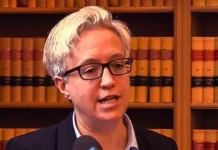
A multi-billion dollar highway initiative in Portland’s Rose Quarter is set to progress, although state transportation officials admit they currently lack the necessary funds to complete it. On Thursday, members of the Oregon Transportation Commission unanimously voted to initiate the first phase of the Rose Quarter Improvement Project.
Estimated to cost $2.1 billion, the project aims to widen Interstate 5, cover a portion of the freeway, and reconnect the divided Lower Albina neighborhood, which was home to many of Portland’s Black residents before the Oregon Department of Transportation constructed the interstate through it in the 1950s and ’60s, displacing families and demolishing homes and businesses.
The initial phase involves improvements to stormwater management, bridge maintenance, the striping of an auxiliary lane, and the addition of safety signs for highway cover and construction. This phase is projected to cost around $75 million. As of now, the state has secured approximately $447.5 million for the overall project, according to Rose Gerber, a spokesperson for the Oregon Department of Transportation (ODOT).
The decision to proceed with this phase follows a recent failure by lawmakers to pass a significant transportation bill aimed at overhauling Oregon’s transportation system, which included hundreds of millions for major projects like the Rose Quarter. Additionally, federal funding has been reduced.
The project’s costs have escalated in recent years due to inflation and an expanded scope, with several funding sources now uncertain. State transportation funding was not approved during the last legislative session, and the latest federal domestic policy bill eliminated $450 million that officials had anticipated.
The future of the project remains uncertain, with commissioners expressing concerns that further delays could lead to even higher costs. This week, Oregon Governor Tina Kotek called for a special legislative session in August to attempt to finalize a deal that fell through at the end of the previous session. On Wednesday, she introduced a proposal to support the transportation system, but it did not include funding for the Rose Quarter.
State leaders indicated that the focus for the August session will be on allocating funds for state and county transportation agencies, addressing deteriorating infrastructure, and preventing mass layoffs, suggesting that the Rose Quarter project may not be a primary concern.















